Scroll to Recipes with Fenugreek Seeds / मेंथी as ingredient
Fenugreek Seeds is the annual plant that belongs to the family Fabaceae. Also, it is produced majorly in India and used as a herb in cooking, spice and also a vegetable.
Out of total production, Rajasthan contributes 80% of it. çemen is a paste used in Turkish cuisine and its main component is fenugreek.
A related species of it called “blue fenugreek” is used in Georgian cuisine.
Commonly Known as
Fenugreek is commonly known as methi in India.
| Language | Name | Written as |
|---|---|---|
| Arabic | naba’at alhalba | نبات الحلبة |
| Bengali | Mēthi-gācha | মেথি-গাছ |
| Gujarati | Mēthī | મેથી |
| Hindi | menthee | मेंथी |
| Kannada | Mentya | ಮೆಂತ್ಯ |
| Malayalam | uluva | ഉലുവ |
| Marathi | Mēthī | मेथी |
| Punjabi | Mēthī | ਮੇਥੀ |
| Tamil | Ventayam | வெந்தயம் |
| Telugu | Mentulu | మెంతులు |
| Urdu | Mēthī | میتھی |
Benefits
May control diabetes
Fenugreek seeds can be helpful with both type 1 and 2 diabetes. Fenugreek powder consumed by some people suffering from diabetes experienced a reduction in blood sugar levels within 4 hours of intake.
Anti-Oxidant
The waste within the body produced by cells after the processing of food consumed is called free radicals.
If these free radicals are not removed then it can cause problems for the functioning of cells and body function. Fenugreek has been found to possess anti-oxidant that helps fight these free radicals.
Helps in Lowering Cholesterol
Studies have found that fenugreek can help to lower the cholesterol level in our body. By reduction of heart attack with the reduction of cholesterol in our body, as well as the risk of blood clotting.
May Prevent Cancer
Fenugreek has been found to help to prevent cancer. They have properties to exhibit programmed cell death.
Reduces Appetite
Galactomannan is a fiber found in fenugreek. This fiber helps in suppressing the appetite of a person and will make you feel full.
Provides Relief from Sore Throat
Studies find fenugreek seeds to be a mucus solvent and help relieving from sore throat, cold and cough. Moreover, it also helps with respiratory diseases like asthma, tuberculosis, and sinusitis.
Source: lybrate.com
Side Effects
Fenugreek seeds are relatively safe for consumption. However, a few less serious side effects have been noted.
Fenugreek can be responsible for causing diarrhea and indigestion problems if consumed more. You have to be cautious while using fenugreek if you are on medication for diabetes or any other for lowering sugar levels.
Source: lybrate.com
Frequently Asked Questions
How can fenugreek be used in cooking?
Fenugreek is used in sauces and curries. Moreover, you can crush fenugreek seeds and use that for making herbal tea.
Does fenugreek help with diabetes?
Yes, fenugreek seeds help with both types of 1 and 2 diabetes. The seeds contain fiber and chemicals that help to reduce the intake of sugar and carbohydrates.
Source: lybrate.com
What are the other names for fenugreek?
Other names for fenugreek are Greek hay, Greek clover, bird’s foot, fenugreek, hu lu ba, Trigonella and bockshornklee.
Is fenugreek safe for consumption?
Fenugreek is likely to be safe if consumed in the recommended amount orally.

